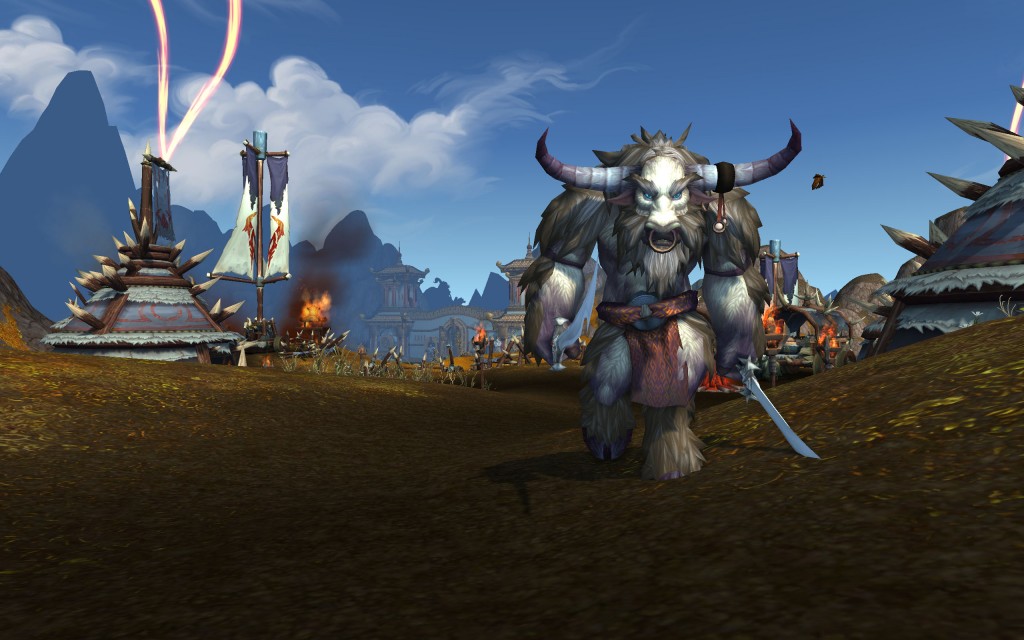Culture
Bit Slap: MM Oh baby, that’s the stuff

There’s a really large chance you’re not reading this right now, because probably you’re far too engrossed in this week’s release of Mists of Pandaria, the latest expansion to the brain-meltingly popular, and somehow not Free to Play, MMORPG, World of Warcraft. For the rest of us, we will offer glassy-eyed stares as our online-gaming friends complain that Warlocks were nerfed in the latest patch or that the new level cap didn’t take long enough to reach. Ahh, the life of an MMO gamer – where Google calendars are packed with Raid schedules rather than reminders that you’re behind on your weekly game column. What is it about MMOs that sets it apart from other genres? What impact have they had on all gamers, regardless of the games they play?
Now what exactly is an MMO? For those initiated amongst you, an MMO is a massively multiplayer online game. There can be MMORPGs, MMOFPS, MMORTSeseses (nobody knows the correct punctuation). These are games meant to be played with other people. Not just a multiplayer component, but rather the entire game itself is built around a large community existing within the game world. Let’s use World of Warcraft as our primary example. You create a character, assign him a race and a class, and then bring him into the land of Azeroth. Throughout your journey you will team up with other players to take down massive bosses, complete quests and trade/sell/auction items. But an MMO is more than that, because through all of this playing, you are also socializing with these players. Text and voice chat are standard in MMOs, and, unlike playing a match in Call of Duty, there is downtime. So how does one fill the time spent journeying or resting in a city? By making friends. These friendships might evolve into an in-game guild, organized group of players, or you might just end up hightailing it away from an angsty teen who is more focused on regaling you with tales of adolescent drama.
Even if you’ve never picked up an MMO, their influence can be felt in almost every console game in both positive and negative ways. Let’s go with the positives first. The most obvious being DLC. MMOs are about keeping a player involved for months and months while most console games can be finished in a few dozen hours (yes, I know, Skyrim). So how do you keep a player from moving away from your game or, gasp, trading it in? Offer DLC. These can range from new costumes and characters to entirely new campaigns, all with the intent to extend the life of a game and, for the cynical among us, keep the money rolling in. Not all DLC is of high quality, but you always have the choice of whether or not to pick it up or pay for it. If DLC was all console games inherited from the MMO structure, I’d be cool. Unfortunately, we also inherited a teeny tiny little issue: unfinished games.
Let me state up front that this is 100% my opinion, but I believe that MMOs ability to get away with releasing broken games that are fixed through later patches has lead to console game developers taking a similar approach. Yes, I know games are more and more complicated and it is impossible to catch everything, but ten minutes of Quality Assurance testing can reveal when some very high profile games (cough, Skyrim, cough) are released virtually unplayable on a console. While releasing a broken game is never acceptable, at least a MMO can use the excuse of having thousands and thousands of players interacting in an online environment. Still, you are paying an upfront cost and, potentially, a monthly fee. This investment tends to speed along the patching process. What about purchasing a console game with a widely reported game-breaking bug? When you hand over your sixty dollars, you are expecting a complete game experience; you are not paying for the promise of a complete experience three months later. Are MMOs completely to blame for this phenomenon? No. Money and release schedules are gigantic factors, but MMOs opened the door for the console developers to bust right on through.
Let’s talk about the “O” in MMO, because online gaming is gigantic thanks in large part to games like World of Warcraft. As a matter of fact, some games that can be played single player are always online. This can mean players come across creations and information left behind by fellow games such as in Dark Souls or Spore. Then, in games like Diablo 3, this creates a barrier of entry for gamers. Don’t have an online connection but want to go loot a dungeon on your own? Don’t even look at Diablo 3, which requires a constant connection. Borderlands 2 can be played on a constant online connection so that at any time fellow Vault Hunters can pop in, with the value of the guns and shields you find increasing with each additional player. This means that even online-averse players like me can find value in teaming up with additional players. Just as long as these people know to never speak to me and follow my lead without question.
While I’m not a fan of MMOs (in fact the longest one I’ve played was DCU Online, and that’s only because my characters was an ass-kicking archer magician), their value cannot be denied. The very concept of games accessing the Internet for additional content, patches, and game play features is due in large part to our MMO ancestors. So even if you don’t see the big deal with Pandas slaying Murlocs, don’t think you’re ever truly free from the MMO experience.